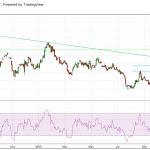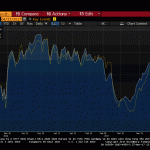
Last year proved another chapter in the road to recovery for the United Kingdom economy, but 2016 remains fraught with challenges owing to the difficult external trade environment and weakening fundamentals domestically. Although the lowest unemployment in over 7-years combined with strong wage growth should be the tailwinds the economy needs to experience sustained expansion, weakness in industrial production combined with softening services spending could continue to drive investors away from the Pound. With monetary policy unlikely to be adjusted for the first half of 2016 and potentially longer, the outlook for the UK Sterling remains precarious with the currency trading at the lowest levels since 2010.
Positive Signs
Even though growth was revised lower for the third quarter to 0.40% from 0.50%, it still underlines the relative stability of the economy during especially challenging conditions for trade and consumption. Annualized GDP expansion currently numbers approximately 2.10%, placing the advanced economy among the best performers for major global currencies. Thanks to the unemployment rate falling to 5.20% and average hourly earnings that have grown by 2.40% year over year, the stage is set for continued growth in 2016 especially if both metrics improve further. Wage growth will remain one of the key drivers of any sustained GDP gains in the country, especially with the figure outpacing inflation, adding to consumer disposable income levels and stoking higher consumption.
Politics, while normally a drag on the economies thanks to added bureaucracy and onerous actions, is surprisingly a tailwind for the UK economy thanks to the Conservative’s presence in the House of Commons. Under the stewardship of David Cameron, the Tories were able to secure a majority that has consequently made it easier to adjust fiscal policy within the nation. One of the prominent problems facing Euro Area peers is that despite highly accommodative monetary policy measures from the European Central bank, the lack of fiscal stimulus combined with austerity driven budgets has not set the stage for a prolonged economic recovery. Fiscal and monetary policy must act in concert to be most effective, something of which UK Chancellor of Exchequer George Osborne is keenly aware.












Leave A Comment